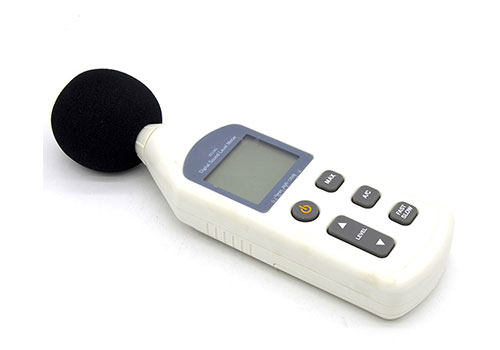Noise Level Meter Buyers Guide
Buying a noise level meter can be a wise move for any business. This is especially the case for those businesses with ongoing concern surrounding the levels of noise they generate. Noise level meters are also useful to have for those businesses that may only occasionally generate a high level of noise, but wish to ensure such activity does not exceed the level they’re permitted to emit under local regulations. So let’s look now at the common questions a business should ask when looking to buy a noise level meter.
The Decibels and Frequency Factor
Decibels are the most common form of sound measurement. Given the general familiarity people have with decibels – and the ease in which to learn how this system for sound measurement works if anyone is unfamiliar – it’s ideal to choose a noise level meter with a decibel reading.
It’s also essential to know some noise level meters can only measure one frequency. In certain instances a business may only require one frequency to measure in. But it’s ideal to have multiple available, and a noise level meter that can measure in the A, C, and Z frequencies will offer the greatest versatility in this regard.
Is it a Class I or a Class II?
There are two classes of sound meter. Both are very precise, but it is Class II that is most often used in workplaces. For any business seeking to acquire noise level meters for use in changing environments – such as an audio technician that will regularly work across different premises – then opting for a Class II noise level meter is the best course of action.
Lighting and Sizing
Sometimes it will be necessary for a noise level reading to be taken in a location with low-light. Yes, it may be possible to use another light source – such as a mobile phone or flashlight – to providing lighting in this instance. But this isn’t necessary when a noise level meter is acquired that can be read in all lighting conditions. Furthermore, for businesses where there is the need for ongoing monitoring throughout the day and multiple noise level meters, opting for devices that are smaller will increase portability.
The Benefits of a Long Battery Life
Usually it will be easy to recharge a noise level meter from one use to the next. But there may be certain times and jobs that will require noise lever measurements to be taken for extended periods of time, or at remote locations. In this instance a long battery life can be very valuable, and many noise level meters can provide over 30 hours of battery life even while experiencing heavy-usage during that time.
Making a Sound Move
The reality is it’s easy for many businesses to either generate excessive noise, or find an activity nearby – such as a construction work next door, road maintenance works, or similar – can rise to a level where it becomes unsafe for others nearby without adequate hearing protection. That’s why a noise level meter can be so useful to have on-hand.

